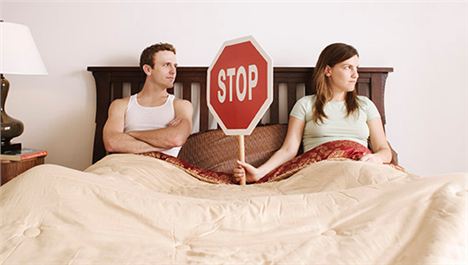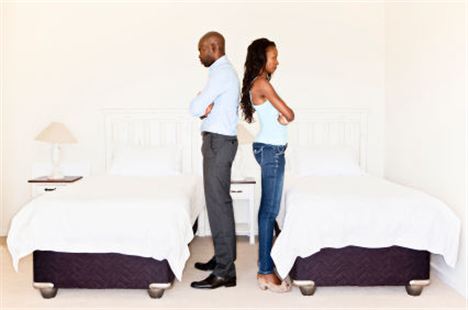AFTER a foot in the face and an elbow in the rib too many, battle lines are likely to be drawn in the marital bed. The pillow talk narrative is quickly changed from sweet nothings to "there's your side and I'mma stayin' on mine. G'night".
"Getting good quality sleep is what matters most for the health and wellbeing of both partners – as well as the health of the relationship."
We're lead to believe by romance novellas and movies that the sanctity of a relationship is salvaged between the sheets - it’s where ‘the magic happens’ as they’d say on MTV Cribs. But surely there’s no magic to be had if you’re not getting any sleep.
Is there any wonder why more couples are choosing to opt out of the marital bed?
Research revealed by 'bed specialists' Dreams Matters say up to one in five British couples are choosing to sleep in separate beds.
While the Edinburgh International Science Festival would argue 94% of couples who spend the night in contact with each other are said to happy with their relationship, the study claims that 25% of couples argue in bed because they are kept awake by their partners. Sleeping in separate beds may be the answer to help salvage REM sleep.
"If you don’t sleep well because of your partner, the danger is that you will start to resent each other. When you are tired, it’s natural to become irritable and you are more likely to argue over small things than to resolve differences in a calm manner,"says Dr Sarah Brewer a GP, Registered Nutritionist, Nutritional Therapist and health writer.
Brewer explains in her post for Dream Matters, that with an estimated 13 million Brits waking regularly at night with muscle cramps, often several times a week, a separate room or bed may be a better solution. Especially for those of a more mature age, where there are the added issues of night sweats for women with menopausal symptoms, and nocturnal bathroom visits for men with prostate problems.
 Battle lines drawn in the marital bed.
Battle lines drawn in the marital bed.
Getting a good night's sleep, of course, is important for any human being to function. Yet, what about sex - the other important activity that happens under covers? The idea of tip-toeing into your partner's quarters for a late night rendevouz may tititilate some couples (it works for the Queen and Prince Philip, after all) yet, for many, sleeping in separate beds sparks crisis warnings in their relationship. Does the romance die if you admit that you don't want to sleep next to your partner anymore?
"Partners can still find time to be close and intimate,"says Dr Brewer, "but may benefit from moving to a separate bed or bedroom at the point of turning out the light to sleep – and it could even make the relationship stronger."
Dr Brewer adds: "Not sleeping together, if it works for you both, is a mature pragmatic solution to a problem and has no bearing on the strength, or otherwise, of your relationship.
"Getting good quality sleep is what matters most for the health and wellbeing of both partners – as well as the health of the relationship."
For others, the intimacy of a good-old spoon session would be missed if their parter hopped it to another room. For those who aren't keen on kicking their partner out of bed (even if they snore like a pneumatic drill, or have the body heat of hell fire) Dream Matters have summarised the best tips to a restful sleep together:
TIPS FOR A RESTFUL NIGHT SLEEP WITH YOUR PARTNER
- Couples should never go to sleep stressed – as far as possible, they should avoid difficult conversations before bedtime and try relaxing with a warm bath, quiet music or even light yoga.
- If one partner is a night owl and one is an early bird, they should try to stick to the same schedule and find the middle ground, so one does not disturb the other.
- Those who keep their partner awake with noisy snoring should avoid sleeping on their back, and should even visit a doctor if the issue becomes serious as it can be a sign of health issues.
- Both partners should steer clear of stimulants, such as caffeinated or fizzy drinks and chocolate, for at least four hours before going to sleep.
- According to Chris Thomson, writing for Dreams Sleep Matters, sleeping naked could be the answer. Skin-to-skin contact can boost the production of oxytocin, also known as the ‘love hormone’, which can combat stress and high blood pressure, as well as making one feel closer to their partner.
More advice on sleep and wellbeing can be found on the Dreams Sleep Matters website.
Follow @LOreal_B on Twitter












